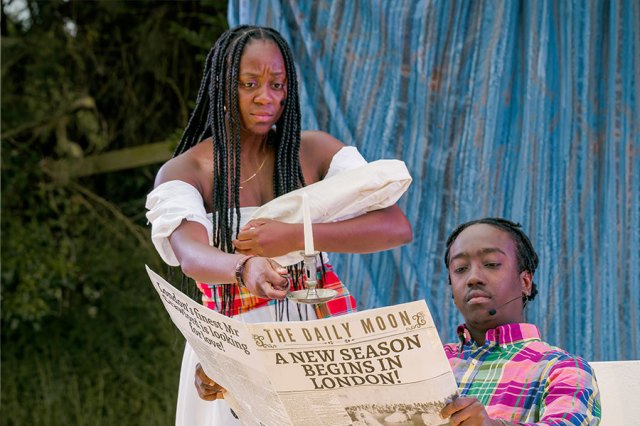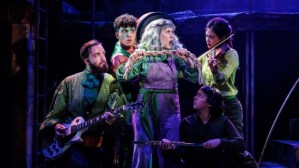Mansfield Park at the Watermill – review
A mould-breaking, eye-opening drama with music, co-produced by the Watermill and Two Gents Productions, arrives at the Watermill after a rural tour including Jane Austen’s House

It would be hard to find a more mould-breaking, eye-opening – and exhilaratingly joyous – reimagining of Jane Austen’s third published novel than this production co-directed by Arne Pohlmeier and Two Gents Theatre Company’s Tonderai Munyevu.
Pohlmeier also provides the illuminating programme page on Jane Austen, Mary Prince, Antigua and the Transatlantic Slave Trade, which fills in the background to Austen’s text that led to the production. Sir Thomas Bertram, owner of the estate that gives the novel its name, travels to Antigua. As Pohlmeier explains: “We decided to draw on the account of an actor who has first-hand knowledge of the life of enslaved people on Antigua: Mary Prince.
“Mary was born into slavery in 1788… her autobiography was published in 1831, the first narrative of the life of a Black woman published in England. Mansfield Park was published in 1814.” All this more than justifies the inclusion of Mary Prince as a commentating, contextualising character.
The setting in the Watermill’s glorious gardens is ideal for action taking place on a country estate. And I do mean “action”! The mood is exhilarating from the moment the extraordinarily talented and exuberant cast burst onto the white stage through the audience, to the exciting upbeat strains of the music they play on everything they can lay their hands on (kudos to sound designer and composer Holly Khan). That includes the giant “sugar cubes”, which designer Louise Worrall explains in a programme note, are used on that white stage “to encourage the audience to think about where this wealth (of the Bertram family, who take in their ‘poor relation’ young Fanny, Austen’s heroine) has come from – sugar was the cash crop of Antigua, where Sir Thomas Bertram has his plantation… grown and processed by the forced labour of enslaved Africans”.
Although as Worrall says, there is a deal of white in the costumes, there are delicious touches and swathes of colour too. There’s the rainbow sash sported by Belle Tshabalala’s vociferously self-assertive Mariah Bertram, daughter of the house and three years older than Fanny; and the pastel-coloured Madras check fabric of the men’s shirts that Worrall tells us makes up the official national dress of several nations of the Caribbean. And the elaborate giant golden picture frame centre stage provides an attractive invitation to enter the world of Mansfield Park.
Although it is never less than thoughtful and thought provoking, it is the energy, the verve of the cast, the singing and the music, that grabs us and takes us into the story. Notably, it is the ‘host’ family who take centre stage first, self assertive every one. Their versatility extends to each playing several characters, often of both sexes and different ages.
Anni Domingo is especially authoritative, passionate and eloquent, switching swiftly between roles. She it is who gets to play real-life character, commentator and ex slave Mary Prince, as well as bossy Aunt Norris, who is notably mean to poor Fanny. As another Mary, Crawford this time, she is one of the girls seeking a husband – and she even gets to be one of the three actors who portray Sir Thomas Bertram at various key moments.
Wela Mbusi is actually the only man who gets to play Sir Thomas, sharing the role with Bella Tshabalala as well as Domingo. Notably though, he also gets to play Julia Bertram – youngest of the four Bertram children and equally mean to Fanny – and the less than ideal Mr Rushworth whose proposal is nonetheless accepted by Tshabalala’s vivid, sparkling (sometimes icily, where Fanny is concerned!) Mariah. Girlpower and solidarity is therefore not a thing here, with so much rivalry for the available men.
Duramaney Kamara is a strikingly fit and handsome Edmund Bertram, entirely appropriate as the eventual hero (spoiler alert!) and also a rockin’ DJ. The whole cast act as chorus members and narrators, giving us signposts along the way to mark out each scene. That includes Nicholle Cherrie, who is Fanny. I’ve left her complex and powerful performance until last, for she is appropriately the only actor who sticks to one named role, just because it is so central. At first, her downcast demeanour displays her diffidence and uncertainty as she finds herself out of her depth and unwelcome in the eponymous home of the privileged relatives who grudgingly take her in. That initial relative stillness works so well and it is a joy to see her blossom and find not just happiness, but her voice as a confident assertive young woman.
Austen’s heroines do indeed tend to find happiness. There are wonderful treats on the way, notably a fun stab at amateur dramatics as the young people put on a play – appropriately called ‘Lovers’ Vows’. The eye-opening USP of this production is undoubtedly the examination, the foregrounding of Austen’s background theme of the exploitation of the enslaved Africans. It’s a great tribute to all involved that it is shared so clearly without losing any of that high-spirited joy – which if anything actually makes it easier to share.















